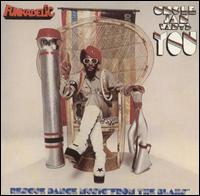Reception
With a 4 out of 5 star rating, Paul Sexton of Record Mirror wrote: "Last year the Funkadelic battle campaign was based on the idea of having one nation under a groove. This year the plan is to Rescue Dance Music from the Blahs. No, I don't understand either, but once again this is marvellously enjoyable comic book funk." [17] The Bay State Banner concluded that, "on Side Two and 'Freak of the Week', we find the sort of directionless noise that sometimes ruins Funkadelic concerts—rhythmic anarchy and vocal chipmunk-ism instead of the clean and nasty, low-register funk and howling, inconsolable guitar solos." [13] The Globe and Mail determined that "the cover is misleading; one expects a record jammed with disco tracks and instead receives sensitive, even contemplative rhythm and blues." [21]
The New York Times noted that "Holly Wants to Go to California" "is the sort of social satire that Frank Zappa and the Mothers used to do so well." [1] Rolling Stone opined that "the strongest material here—notably the first ten minutes or so of '(Not Just) Knee Deep', with its snazzy synthesizer fills, razor-sharp Michael Hampton guitar solo, raucous vocals, and hook upon hook—is state-of-the-art black pop music." [22]
Ned Raggett of AllMusic stated that the album starts "out like a parody of patriotic recruitment ads before hitting its full, funky stride... It's still very much a disco effort, but one overtly spiking the brew even more than before with P-Funk's own particular recipe, mock drill instructors calling out dance commands and so forth." [12]
This page is based on this
Wikipedia article Text is available under the
CC BY-SA 4.0 license; additional terms may apply.
Images, videos and audio are available under their respective licenses.
